Organisational Behaviour Report: IHG, Culture, Motivation, Teams
VerifiedAdded on 2023/01/19
|19
|6892
|58
Report
AI Summary
This report delves into the realm of organisational behaviour, using Intercontinental Hotels Group (IHG) as a case study. It begins by analysing how organisational culture, politics, and power influence individual and team behaviour and performance, exploring Handy's model to define IHG's culture and the impact of different power structures. The report then evaluates content and process theories of motivation, along with motivational techniques, to assess their effectiveness in achieving organisational goals. Furthermore, it examines the characteristics of effective and ineffective teams. Finally, the report applies various concepts and philosophies of organisational behaviour to a given business situation within IHG, offering recommendations for fostering a positive and productive work environment. The report emphasizes the importance of task culture, reward power, and the adoption of 'the High Ground' approach for IHG to improve employee performance and achieve its objectives.
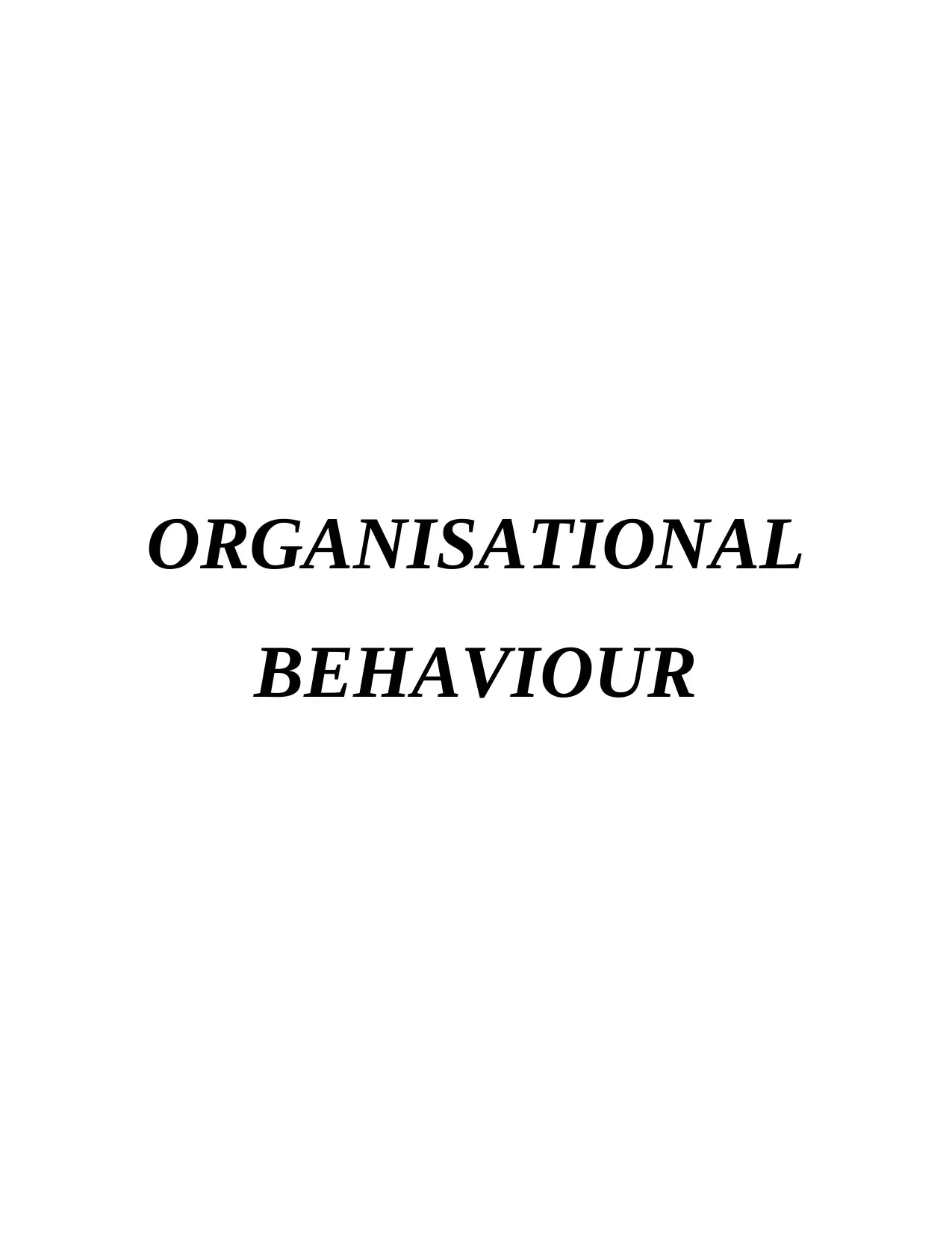
ORGANISATIONAL
BEHAVIOUR
BEHAVIOUR
Paraphrase This Document
Need a fresh take? Get an instant paraphrase of this document with our AI Paraphraser
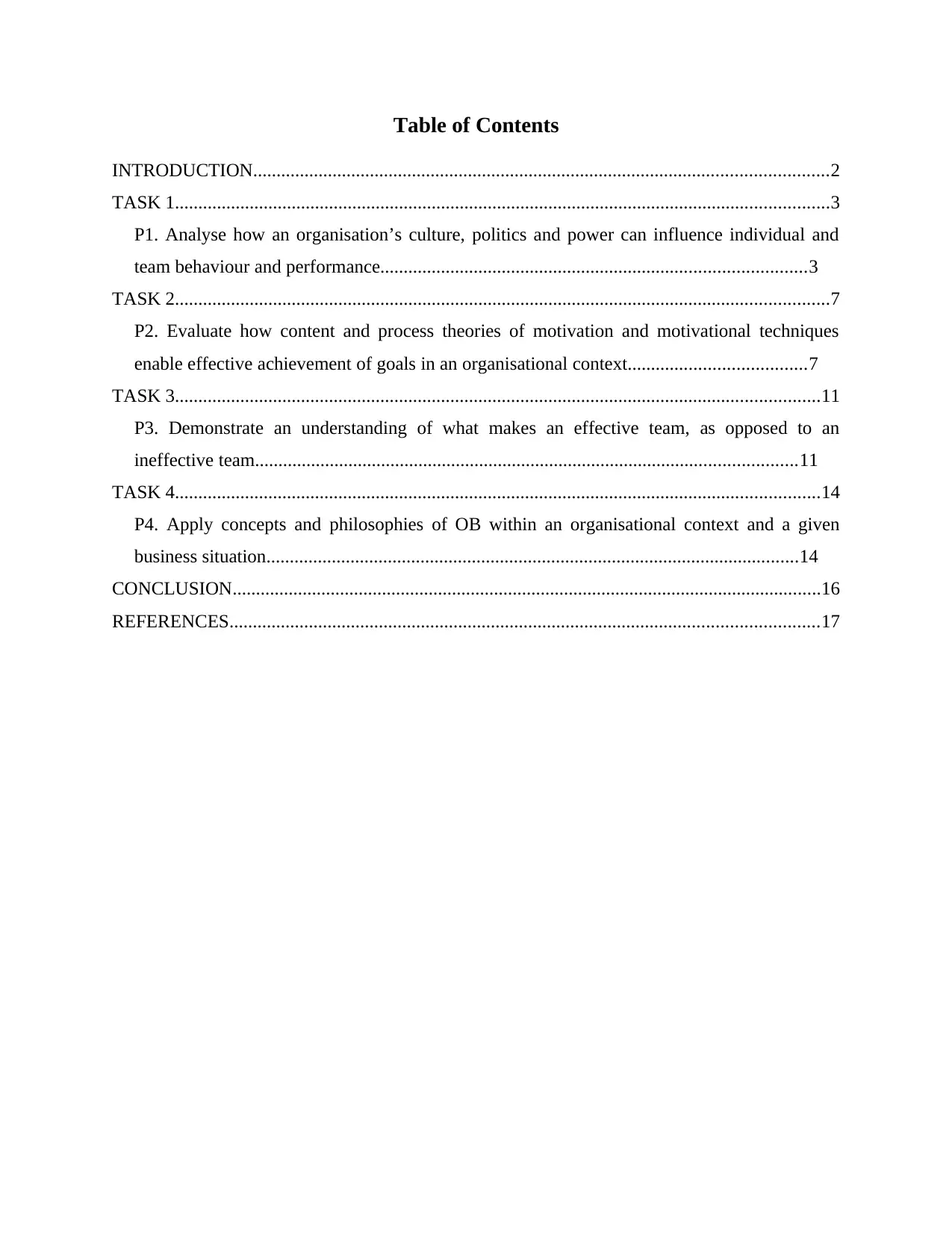
Table of Contents
INTRODUCTION...........................................................................................................................2
TASK 1............................................................................................................................................3
P1. Analyse how an organisation’s culture, politics and power can influence individual and
team behaviour and performance...........................................................................................3
TASK 2............................................................................................................................................7
P2. Evaluate how content and process theories of motivation and motivational techniques
enable effective achievement of goals in an organisational context......................................7
TASK 3..........................................................................................................................................11
P3. Demonstrate an understanding of what makes an effective team, as opposed to an
ineffective team....................................................................................................................11
TASK 4..........................................................................................................................................14
P4. Apply concepts and philosophies of OB within an organisational context and a given
business situation..................................................................................................................14
CONCLUSION..............................................................................................................................16
REFERENCES..............................................................................................................................17
INTRODUCTION...........................................................................................................................2
TASK 1............................................................................................................................................3
P1. Analyse how an organisation’s culture, politics and power can influence individual and
team behaviour and performance...........................................................................................3
TASK 2............................................................................................................................................7
P2. Evaluate how content and process theories of motivation and motivational techniques
enable effective achievement of goals in an organisational context......................................7
TASK 3..........................................................................................................................................11
P3. Demonstrate an understanding of what makes an effective team, as opposed to an
ineffective team....................................................................................................................11
TASK 4..........................................................................................................................................14
P4. Apply concepts and philosophies of OB within an organisational context and a given
business situation..................................................................................................................14
CONCLUSION..............................................................................................................................16
REFERENCES..............................................................................................................................17
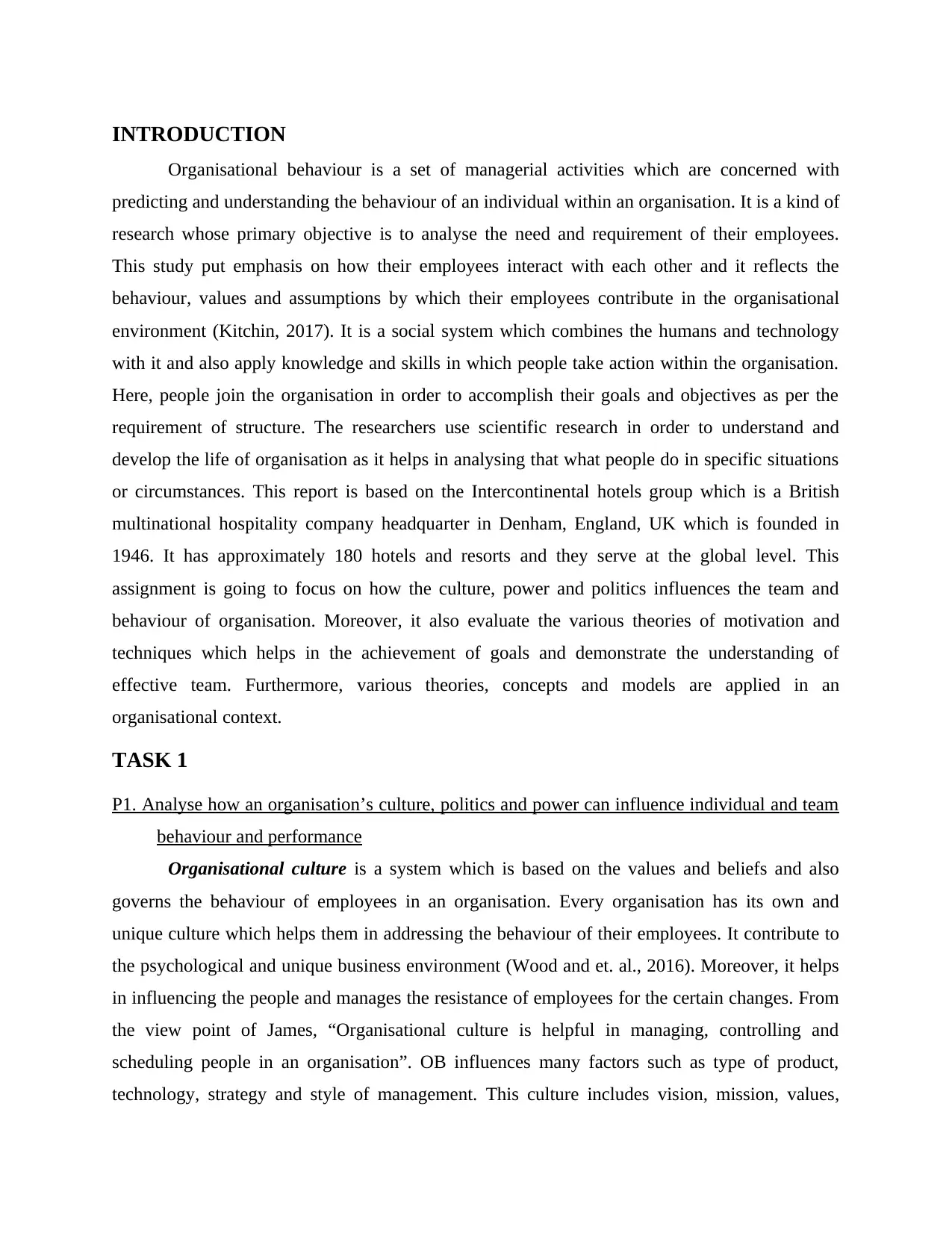
INTRODUCTION
Organisational behaviour is a set of managerial activities which are concerned with
predicting and understanding the behaviour of an individual within an organisation. It is a kind of
research whose primary objective is to analyse the need and requirement of their employees.
This study put emphasis on how their employees interact with each other and it reflects the
behaviour, values and assumptions by which their employees contribute in the organisational
environment (Kitchin, 2017). It is a social system which combines the humans and technology
with it and also apply knowledge and skills in which people take action within the organisation.
Here, people join the organisation in order to accomplish their goals and objectives as per the
requirement of structure. The researchers use scientific research in order to understand and
develop the life of organisation as it helps in analysing that what people do in specific situations
or circumstances. This report is based on the Intercontinental hotels group which is a British
multinational hospitality company headquarter in Denham, England, UK which is founded in
1946. It has approximately 180 hotels and resorts and they serve at the global level. This
assignment is going to focus on how the culture, power and politics influences the team and
behaviour of organisation. Moreover, it also evaluate the various theories of motivation and
techniques which helps in the achievement of goals and demonstrate the understanding of
effective team. Furthermore, various theories, concepts and models are applied in an
organisational context.
TASK 1
P1. Analyse how an organisation’s culture, politics and power can influence individual and team
behaviour and performance
Organisational culture is a system which is based on the values and beliefs and also
governs the behaviour of employees in an organisation. Every organisation has its own and
unique culture which helps them in addressing the behaviour of their employees. It contribute to
the psychological and unique business environment (Wood and et. al., 2016). Moreover, it helps
in influencing the people and manages the resistance of employees for the certain changes. From
the view point of James, “Organisational culture is helpful in managing, controlling and
scheduling people in an organisation”. OB influences many factors such as type of product,
technology, strategy and style of management. This culture includes vision, mission, values,
Organisational behaviour is a set of managerial activities which are concerned with
predicting and understanding the behaviour of an individual within an organisation. It is a kind of
research whose primary objective is to analyse the need and requirement of their employees.
This study put emphasis on how their employees interact with each other and it reflects the
behaviour, values and assumptions by which their employees contribute in the organisational
environment (Kitchin, 2017). It is a social system which combines the humans and technology
with it and also apply knowledge and skills in which people take action within the organisation.
Here, people join the organisation in order to accomplish their goals and objectives as per the
requirement of structure. The researchers use scientific research in order to understand and
develop the life of organisation as it helps in analysing that what people do in specific situations
or circumstances. This report is based on the Intercontinental hotels group which is a British
multinational hospitality company headquarter in Denham, England, UK which is founded in
1946. It has approximately 180 hotels and resorts and they serve at the global level. This
assignment is going to focus on how the culture, power and politics influences the team and
behaviour of organisation. Moreover, it also evaluate the various theories of motivation and
techniques which helps in the achievement of goals and demonstrate the understanding of
effective team. Furthermore, various theories, concepts and models are applied in an
organisational context.
TASK 1
P1. Analyse how an organisation’s culture, politics and power can influence individual and team
behaviour and performance
Organisational culture is a system which is based on the values and beliefs and also
governs the behaviour of employees in an organisation. Every organisation has its own and
unique culture which helps them in addressing the behaviour of their employees. It contribute to
the psychological and unique business environment (Wood and et. al., 2016). Moreover, it helps
in influencing the people and manages the resistance of employees for the certain changes. From
the view point of James, “Organisational culture is helpful in managing, controlling and
scheduling people in an organisation”. OB influences many factors such as type of product,
technology, strategy and style of management. This culture includes vision, mission, values,
⊘ This is a preview!⊘
Do you want full access?
Subscribe today to unlock all pages.

Trusted by 1+ million students worldwide
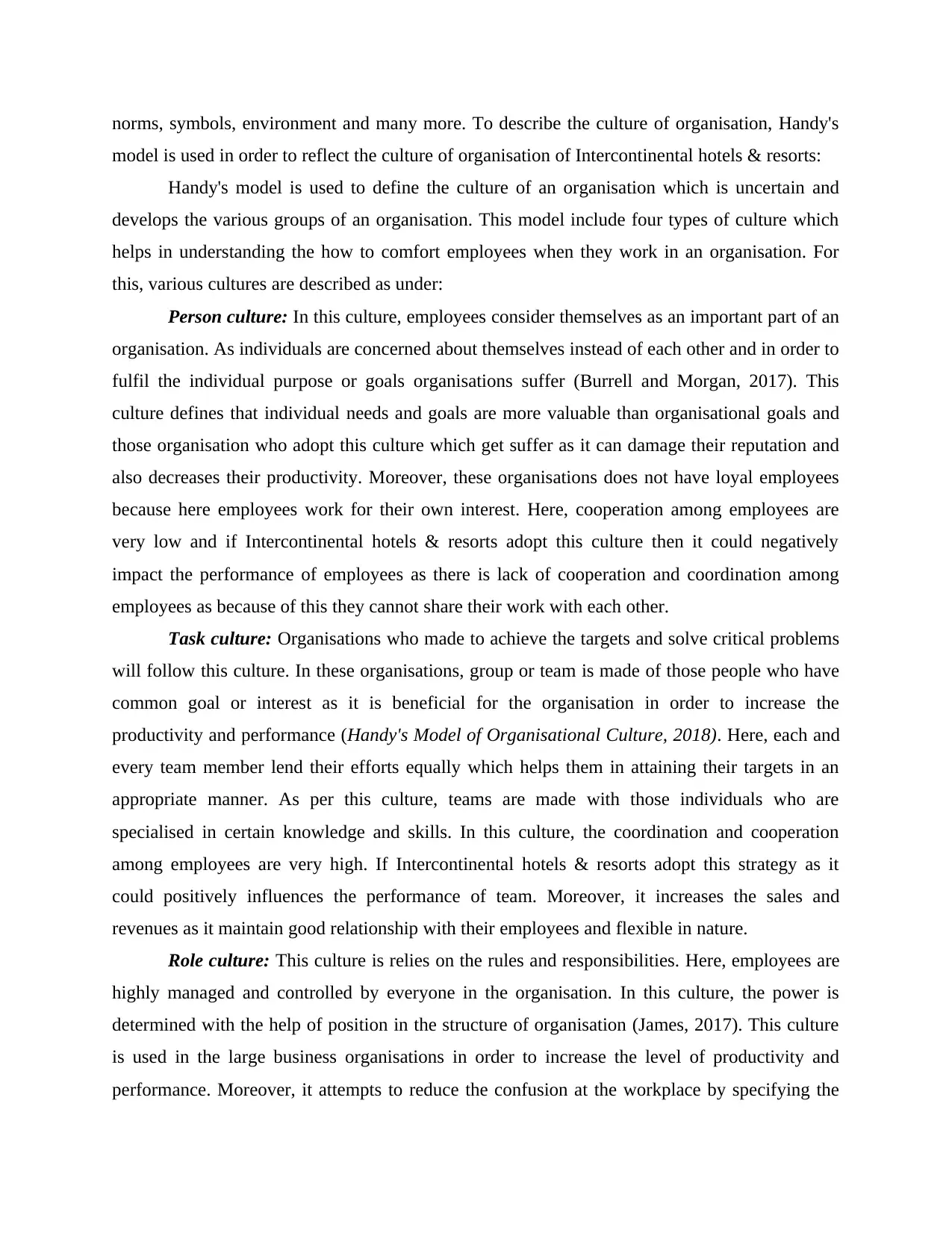
norms, symbols, environment and many more. To describe the culture of organisation, Handy's
model is used in order to reflect the culture of organisation of Intercontinental hotels & resorts:
Handy's model is used to define the culture of an organisation which is uncertain and
develops the various groups of an organisation. This model include four types of culture which
helps in understanding the how to comfort employees when they work in an organisation. For
this, various cultures are described as under:
Person culture: In this culture, employees consider themselves as an important part of an
organisation. As individuals are concerned about themselves instead of each other and in order to
fulfil the individual purpose or goals organisations suffer (Burrell and Morgan, 2017). This
culture defines that individual needs and goals are more valuable than organisational goals and
those organisation who adopt this culture which get suffer as it can damage their reputation and
also decreases their productivity. Moreover, these organisations does not have loyal employees
because here employees work for their own interest. Here, cooperation among employees are
very low and if Intercontinental hotels & resorts adopt this culture then it could negatively
impact the performance of employees as there is lack of cooperation and coordination among
employees as because of this they cannot share their work with each other.
Task culture: Organisations who made to achieve the targets and solve critical problems
will follow this culture. In these organisations, group or team is made of those people who have
common goal or interest as it is beneficial for the organisation in order to increase the
productivity and performance (Handy's Model of Organisational Culture, 2018). Here, each and
every team member lend their efforts equally which helps them in attaining their targets in an
appropriate manner. As per this culture, teams are made with those individuals who are
specialised in certain knowledge and skills. In this culture, the coordination and cooperation
among employees are very high. If Intercontinental hotels & resorts adopt this strategy as it
could positively influences the performance of team. Moreover, it increases the sales and
revenues as it maintain good relationship with their employees and flexible in nature.
Role culture: This culture is relies on the rules and responsibilities. Here, employees are
highly managed and controlled by everyone in the organisation. In this culture, the power is
determined with the help of position in the structure of organisation (James, 2017). This culture
is used in the large business organisations in order to increase the level of productivity and
performance. Moreover, it attempts to reduce the confusion at the workplace by specifying the
model is used in order to reflect the culture of organisation of Intercontinental hotels & resorts:
Handy's model is used to define the culture of an organisation which is uncertain and
develops the various groups of an organisation. This model include four types of culture which
helps in understanding the how to comfort employees when they work in an organisation. For
this, various cultures are described as under:
Person culture: In this culture, employees consider themselves as an important part of an
organisation. As individuals are concerned about themselves instead of each other and in order to
fulfil the individual purpose or goals organisations suffer (Burrell and Morgan, 2017). This
culture defines that individual needs and goals are more valuable than organisational goals and
those organisation who adopt this culture which get suffer as it can damage their reputation and
also decreases their productivity. Moreover, these organisations does not have loyal employees
because here employees work for their own interest. Here, cooperation among employees are
very low and if Intercontinental hotels & resorts adopt this culture then it could negatively
impact the performance of employees as there is lack of cooperation and coordination among
employees as because of this they cannot share their work with each other.
Task culture: Organisations who made to achieve the targets and solve critical problems
will follow this culture. In these organisations, group or team is made of those people who have
common goal or interest as it is beneficial for the organisation in order to increase the
productivity and performance (Handy's Model of Organisational Culture, 2018). Here, each and
every team member lend their efforts equally which helps them in attaining their targets in an
appropriate manner. As per this culture, teams are made with those individuals who are
specialised in certain knowledge and skills. In this culture, the coordination and cooperation
among employees are very high. If Intercontinental hotels & resorts adopt this strategy as it
could positively influences the performance of team. Moreover, it increases the sales and
revenues as it maintain good relationship with their employees and flexible in nature.
Role culture: This culture is relies on the rules and responsibilities. Here, employees are
highly managed and controlled by everyone in the organisation. In this culture, the power is
determined with the help of position in the structure of organisation (James, 2017). This culture
is used in the large business organisations in order to increase the level of productivity and
performance. Moreover, it attempts to reduce the confusion at the workplace by specifying the
Paraphrase This Document
Need a fresh take? Get an instant paraphrase of this document with our AI Paraphraser
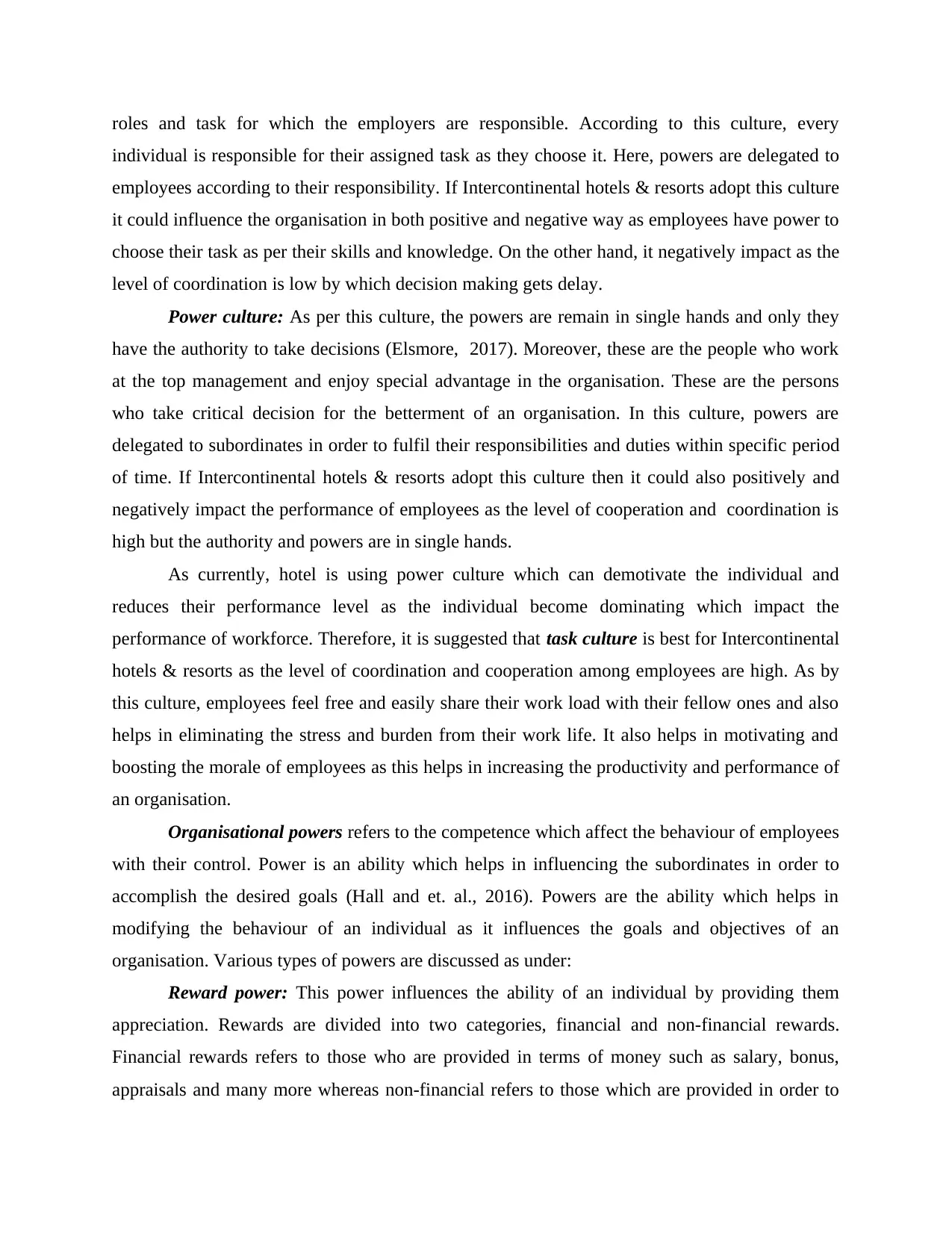
roles and task for which the employers are responsible. According to this culture, every
individual is responsible for their assigned task as they choose it. Here, powers are delegated to
employees according to their responsibility. If Intercontinental hotels & resorts adopt this culture
it could influence the organisation in both positive and negative way as employees have power to
choose their task as per their skills and knowledge. On the other hand, it negatively impact as the
level of coordination is low by which decision making gets delay.
Power culture: As per this culture, the powers are remain in single hands and only they
have the authority to take decisions (Elsmore, 2017). Moreover, these are the people who work
at the top management and enjoy special advantage in the organisation. These are the persons
who take critical decision for the betterment of an organisation. In this culture, powers are
delegated to subordinates in order to fulfil their responsibilities and duties within specific period
of time. If Intercontinental hotels & resorts adopt this culture then it could also positively and
negatively impact the performance of employees as the level of cooperation and coordination is
high but the authority and powers are in single hands.
As currently, hotel is using power culture which can demotivate the individual and
reduces their performance level as the individual become dominating which impact the
performance of workforce. Therefore, it is suggested that task culture is best for Intercontinental
hotels & resorts as the level of coordination and cooperation among employees are high. As by
this culture, employees feel free and easily share their work load with their fellow ones and also
helps in eliminating the stress and burden from their work life. It also helps in motivating and
boosting the morale of employees as this helps in increasing the productivity and performance of
an organisation.
Organisational powers refers to the competence which affect the behaviour of employees
with their control. Power is an ability which helps in influencing the subordinates in order to
accomplish the desired goals (Hall and et. al., 2016). Powers are the ability which helps in
modifying the behaviour of an individual as it influences the goals and objectives of an
organisation. Various types of powers are discussed as under:
Reward power: This power influences the ability of an individual by providing them
appreciation. Rewards are divided into two categories, financial and non-financial rewards.
Financial rewards refers to those who are provided in terms of money such as salary, bonus,
appraisals and many more whereas non-financial refers to those which are provided in order to
individual is responsible for their assigned task as they choose it. Here, powers are delegated to
employees according to their responsibility. If Intercontinental hotels & resorts adopt this culture
it could influence the organisation in both positive and negative way as employees have power to
choose their task as per their skills and knowledge. On the other hand, it negatively impact as the
level of coordination is low by which decision making gets delay.
Power culture: As per this culture, the powers are remain in single hands and only they
have the authority to take decisions (Elsmore, 2017). Moreover, these are the people who work
at the top management and enjoy special advantage in the organisation. These are the persons
who take critical decision for the betterment of an organisation. In this culture, powers are
delegated to subordinates in order to fulfil their responsibilities and duties within specific period
of time. If Intercontinental hotels & resorts adopt this culture then it could also positively and
negatively impact the performance of employees as the level of cooperation and coordination is
high but the authority and powers are in single hands.
As currently, hotel is using power culture which can demotivate the individual and
reduces their performance level as the individual become dominating which impact the
performance of workforce. Therefore, it is suggested that task culture is best for Intercontinental
hotels & resorts as the level of coordination and cooperation among employees are high. As by
this culture, employees feel free and easily share their work load with their fellow ones and also
helps in eliminating the stress and burden from their work life. It also helps in motivating and
boosting the morale of employees as this helps in increasing the productivity and performance of
an organisation.
Organisational powers refers to the competence which affect the behaviour of employees
with their control. Power is an ability which helps in influencing the subordinates in order to
accomplish the desired goals (Hall and et. al., 2016). Powers are the ability which helps in
modifying the behaviour of an individual as it influences the goals and objectives of an
organisation. Various types of powers are discussed as under:
Reward power: This power influences the ability of an individual by providing them
appreciation. Rewards are divided into two categories, financial and non-financial rewards.
Financial rewards refers to those who are provided in terms of money such as salary, bonus,
appraisals and many more whereas non-financial refers to those which are provided in order to
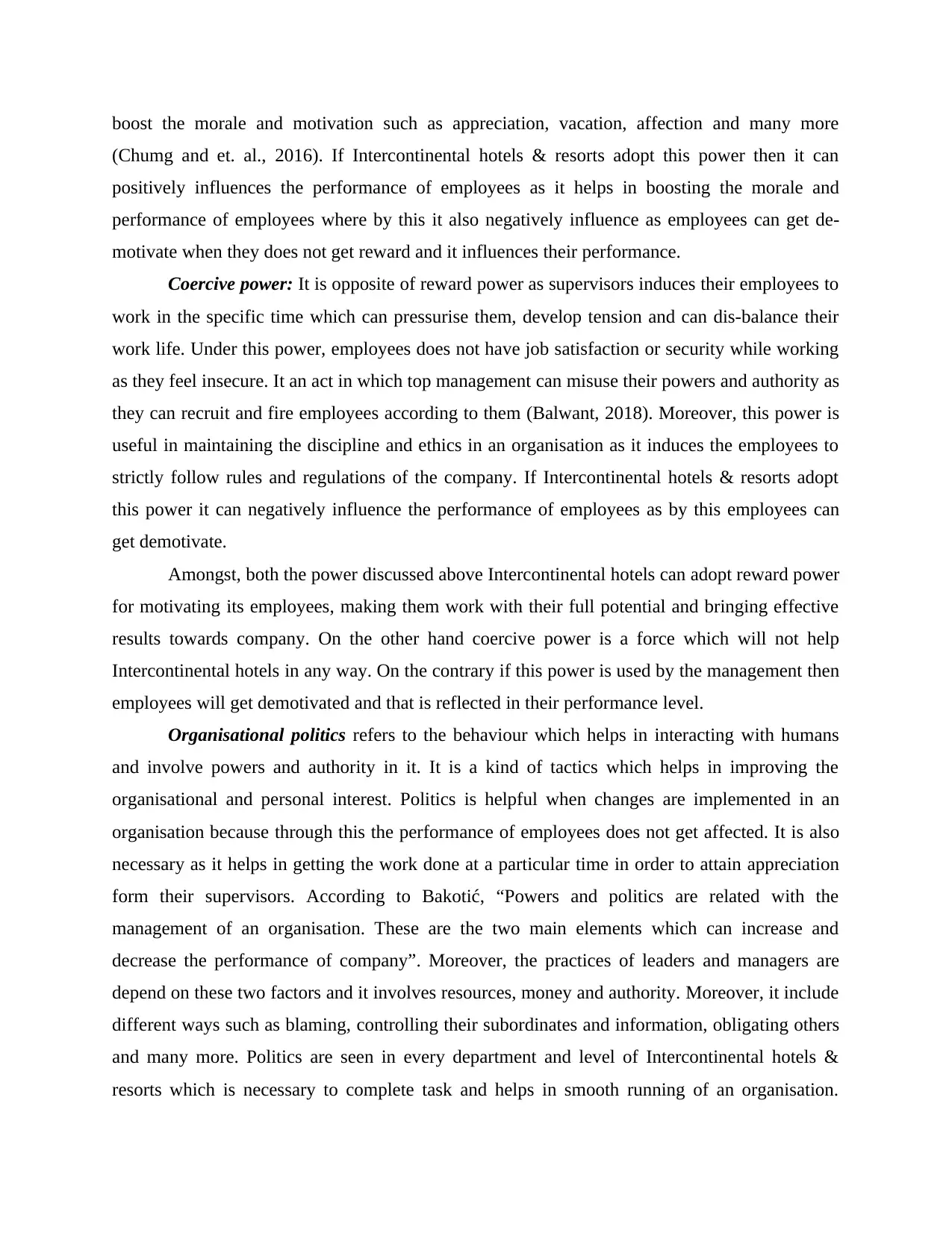
boost the morale and motivation such as appreciation, vacation, affection and many more
(Chumg and et. al., 2016). If Intercontinental hotels & resorts adopt this power then it can
positively influences the performance of employees as it helps in boosting the morale and
performance of employees where by this it also negatively influence as employees can get de-
motivate when they does not get reward and it influences their performance.
Coercive power: It is opposite of reward power as supervisors induces their employees to
work in the specific time which can pressurise them, develop tension and can dis-balance their
work life. Under this power, employees does not have job satisfaction or security while working
as they feel insecure. It an act in which top management can misuse their powers and authority as
they can recruit and fire employees according to them (Balwant, 2018). Moreover, this power is
useful in maintaining the discipline and ethics in an organisation as it induces the employees to
strictly follow rules and regulations of the company. If Intercontinental hotels & resorts adopt
this power it can negatively influence the performance of employees as by this employees can
get demotivate.
Amongst, both the power discussed above Intercontinental hotels can adopt reward power
for motivating its employees, making them work with their full potential and bringing effective
results towards company. On the other hand coercive power is a force which will not help
Intercontinental hotels in any way. On the contrary if this power is used by the management then
employees will get demotivated and that is reflected in their performance level.
Organisational politics refers to the behaviour which helps in interacting with humans
and involve powers and authority in it. It is a kind of tactics which helps in improving the
organisational and personal interest. Politics is helpful when changes are implemented in an
organisation because through this the performance of employees does not get affected. It is also
necessary as it helps in getting the work done at a particular time in order to attain appreciation
form their supervisors. According to Bakotić, “Powers and politics are related with the
management of an organisation. These are the two main elements which can increase and
decrease the performance of company”. Moreover, the practices of leaders and managers are
depend on these two factors and it involves resources, money and authority. Moreover, it include
different ways such as blaming, controlling their subordinates and information, obligating others
and many more. Politics are seen in every department and level of Intercontinental hotels &
resorts which is necessary to complete task and helps in smooth running of an organisation.
(Chumg and et. al., 2016). If Intercontinental hotels & resorts adopt this power then it can
positively influences the performance of employees as it helps in boosting the morale and
performance of employees where by this it also negatively influence as employees can get de-
motivate when they does not get reward and it influences their performance.
Coercive power: It is opposite of reward power as supervisors induces their employees to
work in the specific time which can pressurise them, develop tension and can dis-balance their
work life. Under this power, employees does not have job satisfaction or security while working
as they feel insecure. It an act in which top management can misuse their powers and authority as
they can recruit and fire employees according to them (Balwant, 2018). Moreover, this power is
useful in maintaining the discipline and ethics in an organisation as it induces the employees to
strictly follow rules and regulations of the company. If Intercontinental hotels & resorts adopt
this power it can negatively influence the performance of employees as by this employees can
get demotivate.
Amongst, both the power discussed above Intercontinental hotels can adopt reward power
for motivating its employees, making them work with their full potential and bringing effective
results towards company. On the other hand coercive power is a force which will not help
Intercontinental hotels in any way. On the contrary if this power is used by the management then
employees will get demotivated and that is reflected in their performance level.
Organisational politics refers to the behaviour which helps in interacting with humans
and involve powers and authority in it. It is a kind of tactics which helps in improving the
organisational and personal interest. Politics is helpful when changes are implemented in an
organisation because through this the performance of employees does not get affected. It is also
necessary as it helps in getting the work done at a particular time in order to attain appreciation
form their supervisors. According to Bakotić, “Powers and politics are related with the
management of an organisation. These are the two main elements which can increase and
decrease the performance of company”. Moreover, the practices of leaders and managers are
depend on these two factors and it involves resources, money and authority. Moreover, it include
different ways such as blaming, controlling their subordinates and information, obligating others
and many more. Politics are seen in every department and level of Intercontinental hotels &
resorts which is necessary to complete task and helps in smooth running of an organisation.
⊘ This is a preview!⊘
Do you want full access?
Subscribe today to unlock all pages.

Trusted by 1+ million students worldwide
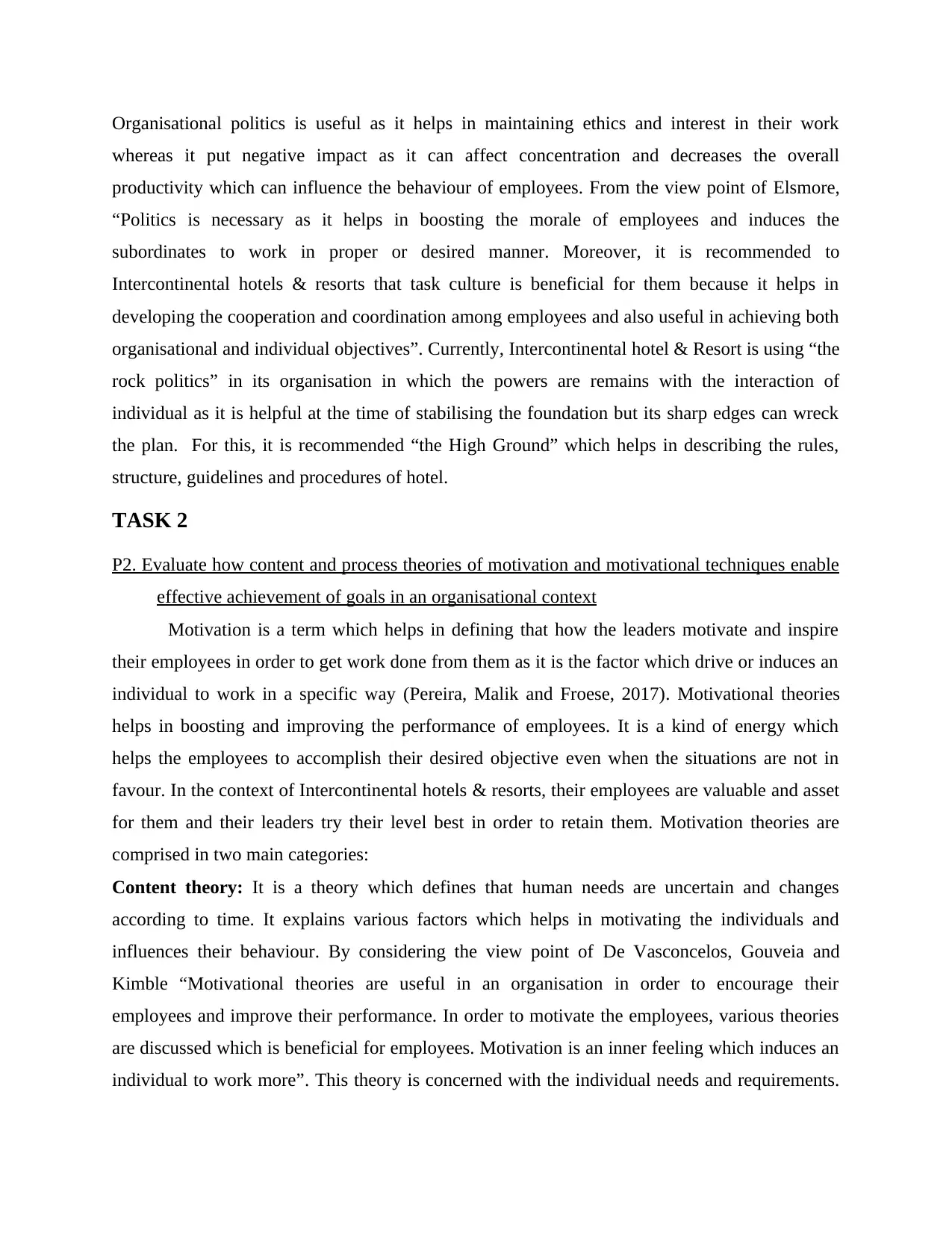
Organisational politics is useful as it helps in maintaining ethics and interest in their work
whereas it put negative impact as it can affect concentration and decreases the overall
productivity which can influence the behaviour of employees. From the view point of Elsmore,
“Politics is necessary as it helps in boosting the morale of employees and induces the
subordinates to work in proper or desired manner. Moreover, it is recommended to
Intercontinental hotels & resorts that task culture is beneficial for them because it helps in
developing the cooperation and coordination among employees and also useful in achieving both
organisational and individual objectives”. Currently, Intercontinental hotel & Resort is using “the
rock politics” in its organisation in which the powers are remains with the interaction of
individual as it is helpful at the time of stabilising the foundation but its sharp edges can wreck
the plan. For this, it is recommended “the High Ground” which helps in describing the rules,
structure, guidelines and procedures of hotel.
TASK 2
P2. Evaluate how content and process theories of motivation and motivational techniques enable
effective achievement of goals in an organisational context
Motivation is a term which helps in defining that how the leaders motivate and inspire
their employees in order to get work done from them as it is the factor which drive or induces an
individual to work in a specific way (Pereira, Malik and Froese, 2017). Motivational theories
helps in boosting and improving the performance of employees. It is a kind of energy which
helps the employees to accomplish their desired objective even when the situations are not in
favour. In the context of Intercontinental hotels & resorts, their employees are valuable and asset
for them and their leaders try their level best in order to retain them. Motivation theories are
comprised in two main categories:
Content theory: It is a theory which defines that human needs are uncertain and changes
according to time. It explains various factors which helps in motivating the individuals and
influences their behaviour. By considering the view point of De Vasconcelos, Gouveia and
Kimble “Motivational theories are useful in an organisation in order to encourage their
employees and improve their performance. In order to motivate the employees, various theories
are discussed which is beneficial for employees. Motivation is an inner feeling which induces an
individual to work more”. This theory is concerned with the individual needs and requirements.
whereas it put negative impact as it can affect concentration and decreases the overall
productivity which can influence the behaviour of employees. From the view point of Elsmore,
“Politics is necessary as it helps in boosting the morale of employees and induces the
subordinates to work in proper or desired manner. Moreover, it is recommended to
Intercontinental hotels & resorts that task culture is beneficial for them because it helps in
developing the cooperation and coordination among employees and also useful in achieving both
organisational and individual objectives”. Currently, Intercontinental hotel & Resort is using “the
rock politics” in its organisation in which the powers are remains with the interaction of
individual as it is helpful at the time of stabilising the foundation but its sharp edges can wreck
the plan. For this, it is recommended “the High Ground” which helps in describing the rules,
structure, guidelines and procedures of hotel.
TASK 2
P2. Evaluate how content and process theories of motivation and motivational techniques enable
effective achievement of goals in an organisational context
Motivation is a term which helps in defining that how the leaders motivate and inspire
their employees in order to get work done from them as it is the factor which drive or induces an
individual to work in a specific way (Pereira, Malik and Froese, 2017). Motivational theories
helps in boosting and improving the performance of employees. It is a kind of energy which
helps the employees to accomplish their desired objective even when the situations are not in
favour. In the context of Intercontinental hotels & resorts, their employees are valuable and asset
for them and their leaders try their level best in order to retain them. Motivation theories are
comprised in two main categories:
Content theory: It is a theory which defines that human needs are uncertain and changes
according to time. It explains various factors which helps in motivating the individuals and
influences their behaviour. By considering the view point of De Vasconcelos, Gouveia and
Kimble “Motivational theories are useful in an organisation in order to encourage their
employees and improve their performance. In order to motivate the employees, various theories
are discussed which is beneficial for employees. Motivation is an inner feeling which induces an
individual to work more”. This theory is concerned with the individual needs and requirements.
Paraphrase This Document
Need a fresh take? Get an instant paraphrase of this document with our AI Paraphraser
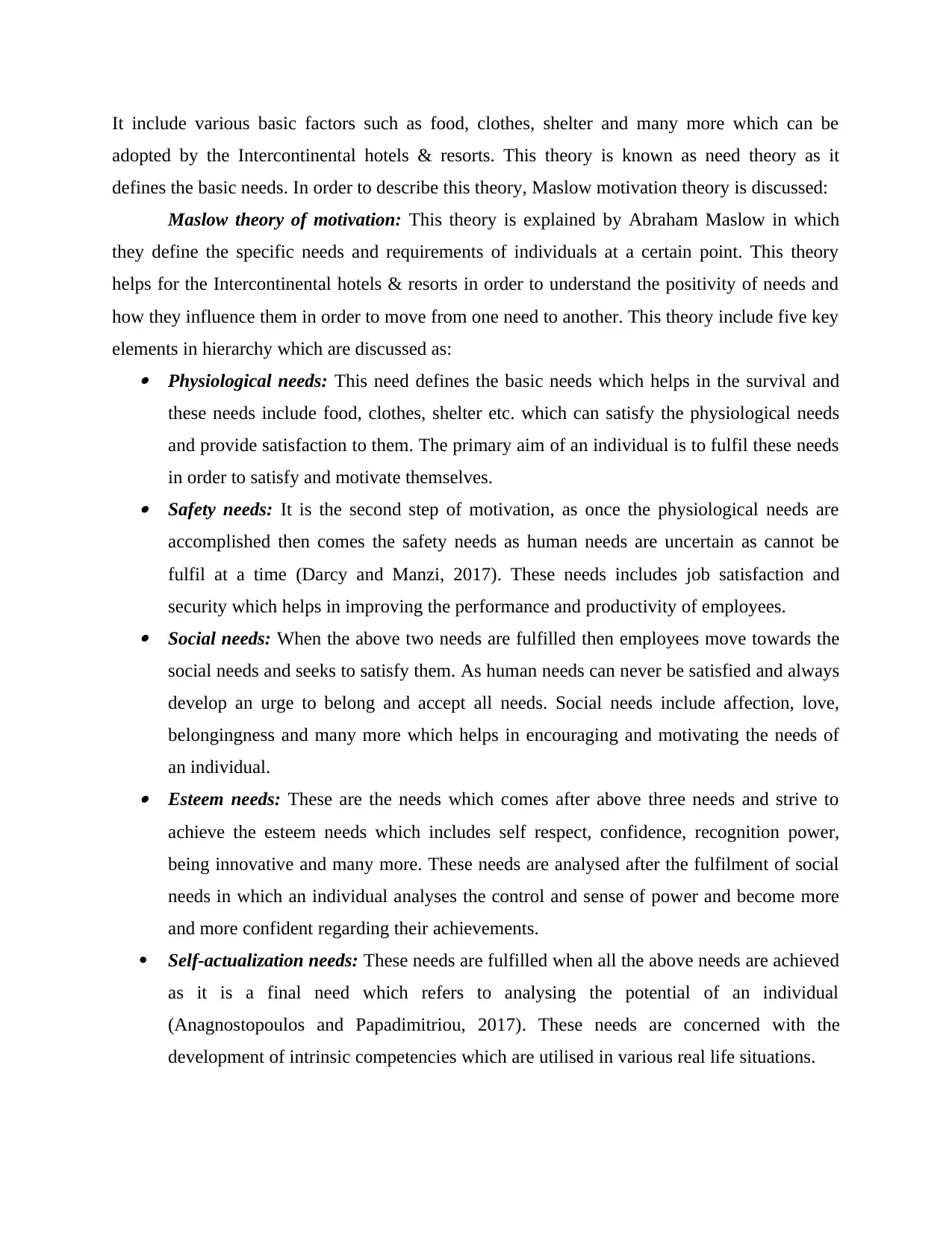
It include various basic factors such as food, clothes, shelter and many more which can be
adopted by the Intercontinental hotels & resorts. This theory is known as need theory as it
defines the basic needs. In order to describe this theory, Maslow motivation theory is discussed:
Maslow theory of motivation: This theory is explained by Abraham Maslow in which
they define the specific needs and requirements of individuals at a certain point. This theory
helps for the Intercontinental hotels & resorts in order to understand the positivity of needs and
how they influence them in order to move from one need to another. This theory include five key
elements in hierarchy which are discussed as: Physiological needs: This need defines the basic needs which helps in the survival and
these needs include food, clothes, shelter etc. which can satisfy the physiological needs
and provide satisfaction to them. The primary aim of an individual is to fulfil these needs
in order to satisfy and motivate themselves. Safety needs: It is the second step of motivation, as once the physiological needs are
accomplished then comes the safety needs as human needs are uncertain as cannot be
fulfil at a time (Darcy and Manzi, 2017). These needs includes job satisfaction and
security which helps in improving the performance and productivity of employees. Social needs: When the above two needs are fulfilled then employees move towards the
social needs and seeks to satisfy them. As human needs can never be satisfied and always
develop an urge to belong and accept all needs. Social needs include affection, love,
belongingness and many more which helps in encouraging and motivating the needs of
an individual. Esteem needs: These are the needs which comes after above three needs and strive to
achieve the esteem needs which includes self respect, confidence, recognition power,
being innovative and many more. These needs are analysed after the fulfilment of social
needs in which an individual analyses the control and sense of power and become more
and more confident regarding their achievements.
Self-actualization needs: These needs are fulfilled when all the above needs are achieved
as it is a final need which refers to analysing the potential of an individual
(Anagnostopoulos and Papadimitriou, 2017). These needs are concerned with the
development of intrinsic competencies which are utilised in various real life situations.
adopted by the Intercontinental hotels & resorts. This theory is known as need theory as it
defines the basic needs. In order to describe this theory, Maslow motivation theory is discussed:
Maslow theory of motivation: This theory is explained by Abraham Maslow in which
they define the specific needs and requirements of individuals at a certain point. This theory
helps for the Intercontinental hotels & resorts in order to understand the positivity of needs and
how they influence them in order to move from one need to another. This theory include five key
elements in hierarchy which are discussed as: Physiological needs: This need defines the basic needs which helps in the survival and
these needs include food, clothes, shelter etc. which can satisfy the physiological needs
and provide satisfaction to them. The primary aim of an individual is to fulfil these needs
in order to satisfy and motivate themselves. Safety needs: It is the second step of motivation, as once the physiological needs are
accomplished then comes the safety needs as human needs are uncertain as cannot be
fulfil at a time (Darcy and Manzi, 2017). These needs includes job satisfaction and
security which helps in improving the performance and productivity of employees. Social needs: When the above two needs are fulfilled then employees move towards the
social needs and seeks to satisfy them. As human needs can never be satisfied and always
develop an urge to belong and accept all needs. Social needs include affection, love,
belongingness and many more which helps in encouraging and motivating the needs of
an individual. Esteem needs: These are the needs which comes after above three needs and strive to
achieve the esteem needs which includes self respect, confidence, recognition power,
being innovative and many more. These needs are analysed after the fulfilment of social
needs in which an individual analyses the control and sense of power and become more
and more confident regarding their achievements.
Self-actualization needs: These needs are fulfilled when all the above needs are achieved
as it is a final need which refers to analysing the potential of an individual
(Anagnostopoulos and Papadimitriou, 2017). These needs are concerned with the
development of intrinsic competencies which are utilised in various real life situations.
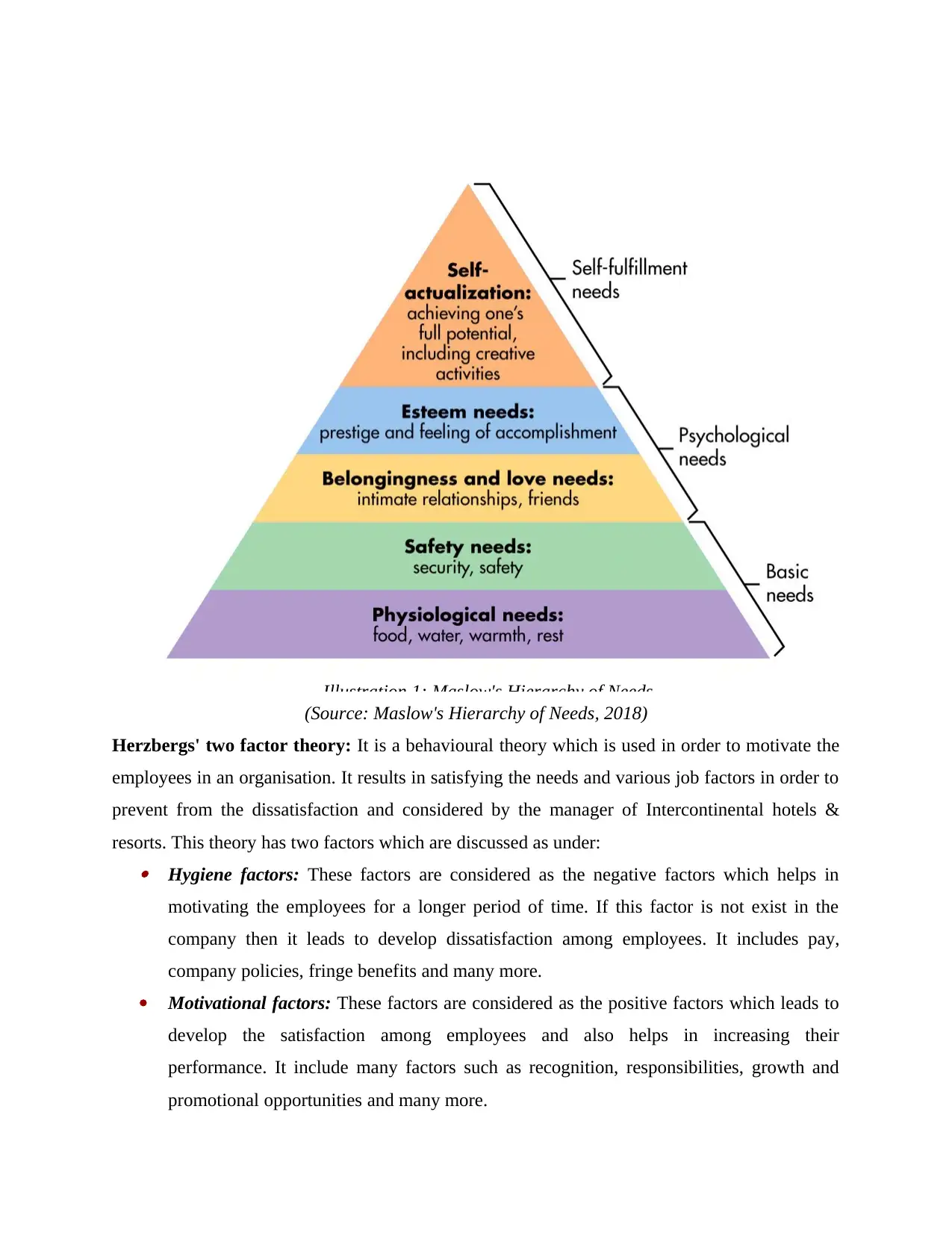
(Source: Maslow's Hierarchy of Needs, 2018)
Herzbergs' two factor theory: It is a behavioural theory which is used in order to motivate the
employees in an organisation. It results in satisfying the needs and various job factors in order to
prevent from the dissatisfaction and considered by the manager of Intercontinental hotels &
resorts. This theory has two factors which are discussed as under: Hygiene factors: These factors are considered as the negative factors which helps in
motivating the employees for a longer period of time. If this factor is not exist in the
company then it leads to develop dissatisfaction among employees. It includes pay,
company policies, fringe benefits and many more.
Motivational factors: These factors are considered as the positive factors which leads to
develop the satisfaction among employees and also helps in increasing their
performance. It include many factors such as recognition, responsibilities, growth and
promotional opportunities and many more.
Illustration 1: Maslow's Hierarchy of Needs
Herzbergs' two factor theory: It is a behavioural theory which is used in order to motivate the
employees in an organisation. It results in satisfying the needs and various job factors in order to
prevent from the dissatisfaction and considered by the manager of Intercontinental hotels &
resorts. This theory has two factors which are discussed as under: Hygiene factors: These factors are considered as the negative factors which helps in
motivating the employees for a longer period of time. If this factor is not exist in the
company then it leads to develop dissatisfaction among employees. It includes pay,
company policies, fringe benefits and many more.
Motivational factors: These factors are considered as the positive factors which leads to
develop the satisfaction among employees and also helps in increasing their
performance. It include many factors such as recognition, responsibilities, growth and
promotional opportunities and many more.
Illustration 1: Maslow's Hierarchy of Needs
⊘ This is a preview!⊘
Do you want full access?
Subscribe today to unlock all pages.

Trusted by 1+ million students worldwide
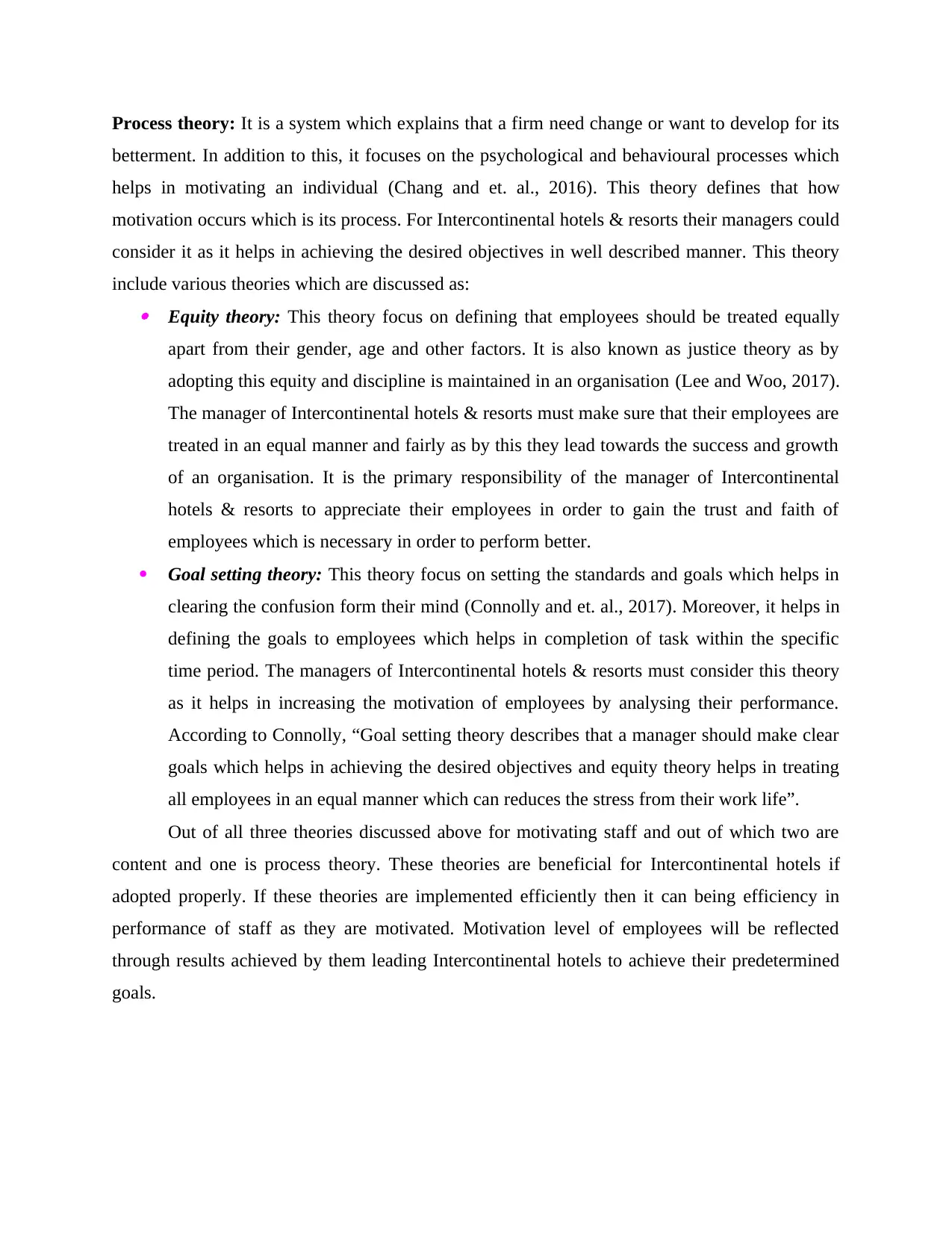
Process theory: It is a system which explains that a firm need change or want to develop for its
betterment. In addition to this, it focuses on the psychological and behavioural processes which
helps in motivating an individual (Chang and et. al., 2016). This theory defines that how
motivation occurs which is its process. For Intercontinental hotels & resorts their managers could
consider it as it helps in achieving the desired objectives in well described manner. This theory
include various theories which are discussed as: Equity theory: This theory focus on defining that employees should be treated equally
apart from their gender, age and other factors. It is also known as justice theory as by
adopting this equity and discipline is maintained in an organisation (Lee and Woo, 2017).
The manager of Intercontinental hotels & resorts must make sure that their employees are
treated in an equal manner and fairly as by this they lead towards the success and growth
of an organisation. It is the primary responsibility of the manager of Intercontinental
hotels & resorts to appreciate their employees in order to gain the trust and faith of
employees which is necessary in order to perform better.
Goal setting theory: This theory focus on setting the standards and goals which helps in
clearing the confusion form their mind (Connolly and et. al., 2017). Moreover, it helps in
defining the goals to employees which helps in completion of task within the specific
time period. The managers of Intercontinental hotels & resorts must consider this theory
as it helps in increasing the motivation of employees by analysing their performance.
According to Connolly, “Goal setting theory describes that a manager should make clear
goals which helps in achieving the desired objectives and equity theory helps in treating
all employees in an equal manner which can reduces the stress from their work life”.
Out of all three theories discussed above for motivating staff and out of which two are
content and one is process theory. These theories are beneficial for Intercontinental hotels if
adopted properly. If these theories are implemented efficiently then it can being efficiency in
performance of staff as they are motivated. Motivation level of employees will be reflected
through results achieved by them leading Intercontinental hotels to achieve their predetermined
goals.
betterment. In addition to this, it focuses on the psychological and behavioural processes which
helps in motivating an individual (Chang and et. al., 2016). This theory defines that how
motivation occurs which is its process. For Intercontinental hotels & resorts their managers could
consider it as it helps in achieving the desired objectives in well described manner. This theory
include various theories which are discussed as: Equity theory: This theory focus on defining that employees should be treated equally
apart from their gender, age and other factors. It is also known as justice theory as by
adopting this equity and discipline is maintained in an organisation (Lee and Woo, 2017).
The manager of Intercontinental hotels & resorts must make sure that their employees are
treated in an equal manner and fairly as by this they lead towards the success and growth
of an organisation. It is the primary responsibility of the manager of Intercontinental
hotels & resorts to appreciate their employees in order to gain the trust and faith of
employees which is necessary in order to perform better.
Goal setting theory: This theory focus on setting the standards and goals which helps in
clearing the confusion form their mind (Connolly and et. al., 2017). Moreover, it helps in
defining the goals to employees which helps in completion of task within the specific
time period. The managers of Intercontinental hotels & resorts must consider this theory
as it helps in increasing the motivation of employees by analysing their performance.
According to Connolly, “Goal setting theory describes that a manager should make clear
goals which helps in achieving the desired objectives and equity theory helps in treating
all employees in an equal manner which can reduces the stress from their work life”.
Out of all three theories discussed above for motivating staff and out of which two are
content and one is process theory. These theories are beneficial for Intercontinental hotels if
adopted properly. If these theories are implemented efficiently then it can being efficiency in
performance of staff as they are motivated. Motivation level of employees will be reflected
through results achieved by them leading Intercontinental hotels to achieve their predetermined
goals.
Paraphrase This Document
Need a fresh take? Get an instant paraphrase of this document with our AI Paraphraser
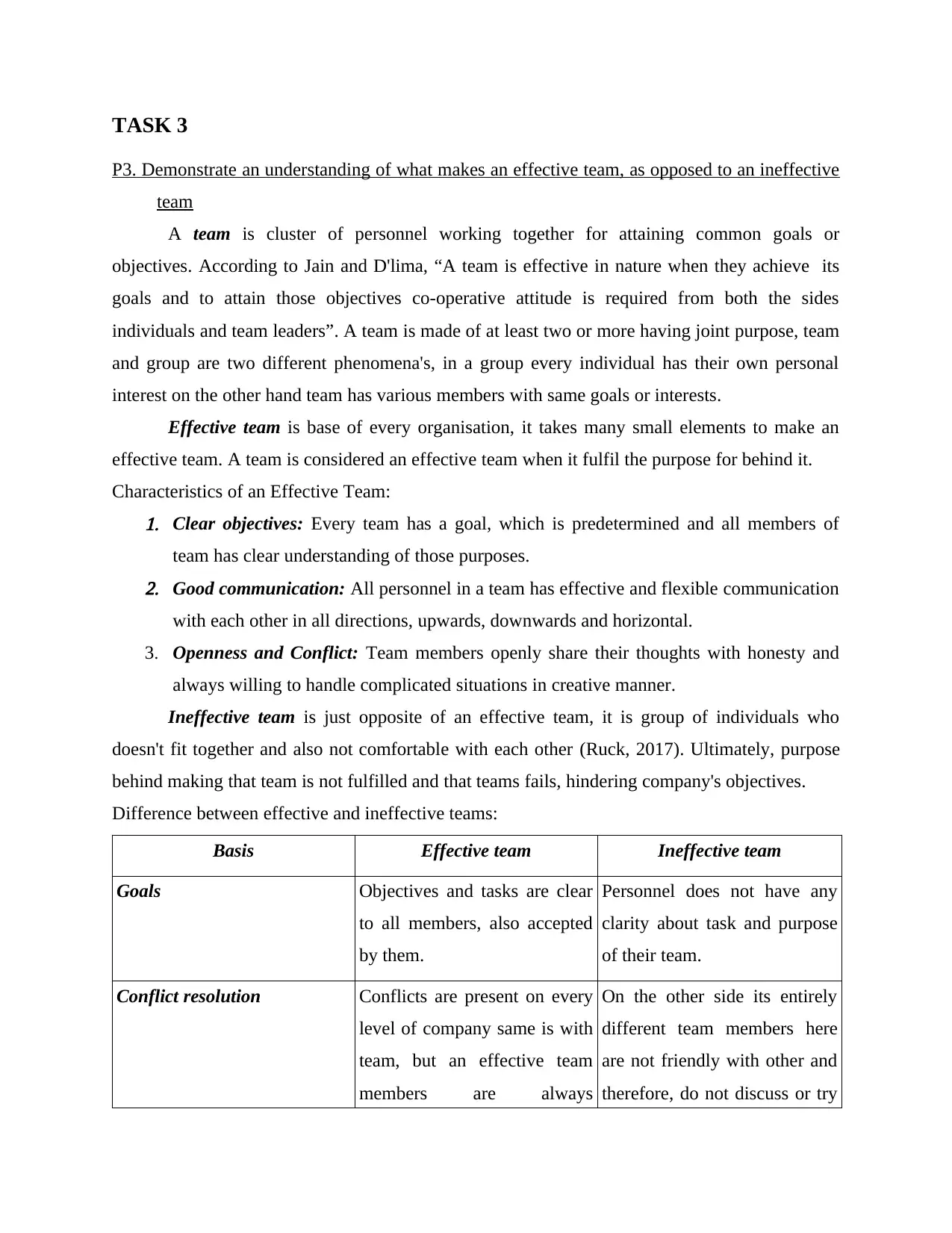
TASK 3
P3. Demonstrate an understanding of what makes an effective team, as opposed to an ineffective
team
A team is cluster of personnel working together for attaining common goals or
objectives. According to Jain and D'lima, “A team is effective in nature when they achieve its
goals and to attain those objectives co-operative attitude is required from both the sides
individuals and team leaders”. A team is made of at least two or more having joint purpose, team
and group are two different phenomena's, in a group every individual has their own personal
interest on the other hand team has various members with same goals or interests.
Effective team is base of every organisation, it takes many small elements to make an
effective team. A team is considered an effective team when it fulfil the purpose for behind it.
Characteristics of an Effective Team:1. Clear objectives: Every team has a goal, which is predetermined and all members of
team has clear understanding of those purposes.2. Good communication: All personnel in a team has effective and flexible communication
with each other in all directions, upwards, downwards and horizontal.
3. Openness and Conflict: Team members openly share their thoughts with honesty and
always willing to handle complicated situations in creative manner.
Ineffective team is just opposite of an effective team, it is group of individuals who
doesn't fit together and also not comfortable with each other (Ruck, 2017). Ultimately, purpose
behind making that team is not fulfilled and that teams fails, hindering company's objectives.
Difference between effective and ineffective teams:
Basis Effective team Ineffective team
Goals Objectives and tasks are clear
to all members, also accepted
by them.
Personnel does not have any
clarity about task and purpose
of their team.
Conflict resolution Conflicts are present on every
level of company same is with
team, but an effective team
members are always
On the other side its entirely
different team members here
are not friendly with other and
therefore, do not discuss or try
P3. Demonstrate an understanding of what makes an effective team, as opposed to an ineffective
team
A team is cluster of personnel working together for attaining common goals or
objectives. According to Jain and D'lima, “A team is effective in nature when they achieve its
goals and to attain those objectives co-operative attitude is required from both the sides
individuals and team leaders”. A team is made of at least two or more having joint purpose, team
and group are two different phenomena's, in a group every individual has their own personal
interest on the other hand team has various members with same goals or interests.
Effective team is base of every organisation, it takes many small elements to make an
effective team. A team is considered an effective team when it fulfil the purpose for behind it.
Characteristics of an Effective Team:1. Clear objectives: Every team has a goal, which is predetermined and all members of
team has clear understanding of those purposes.2. Good communication: All personnel in a team has effective and flexible communication
with each other in all directions, upwards, downwards and horizontal.
3. Openness and Conflict: Team members openly share their thoughts with honesty and
always willing to handle complicated situations in creative manner.
Ineffective team is just opposite of an effective team, it is group of individuals who
doesn't fit together and also not comfortable with each other (Ruck, 2017). Ultimately, purpose
behind making that team is not fulfilled and that teams fails, hindering company's objectives.
Difference between effective and ineffective teams:
Basis Effective team Ineffective team
Goals Objectives and tasks are clear
to all members, also accepted
by them.
Personnel does not have any
clarity about task and purpose
of their team.
Conflict resolution Conflicts are present on every
level of company same is with
team, but an effective team
members are always
On the other side its entirely
different team members here
are not friendly with other and
therefore, do not discuss or try
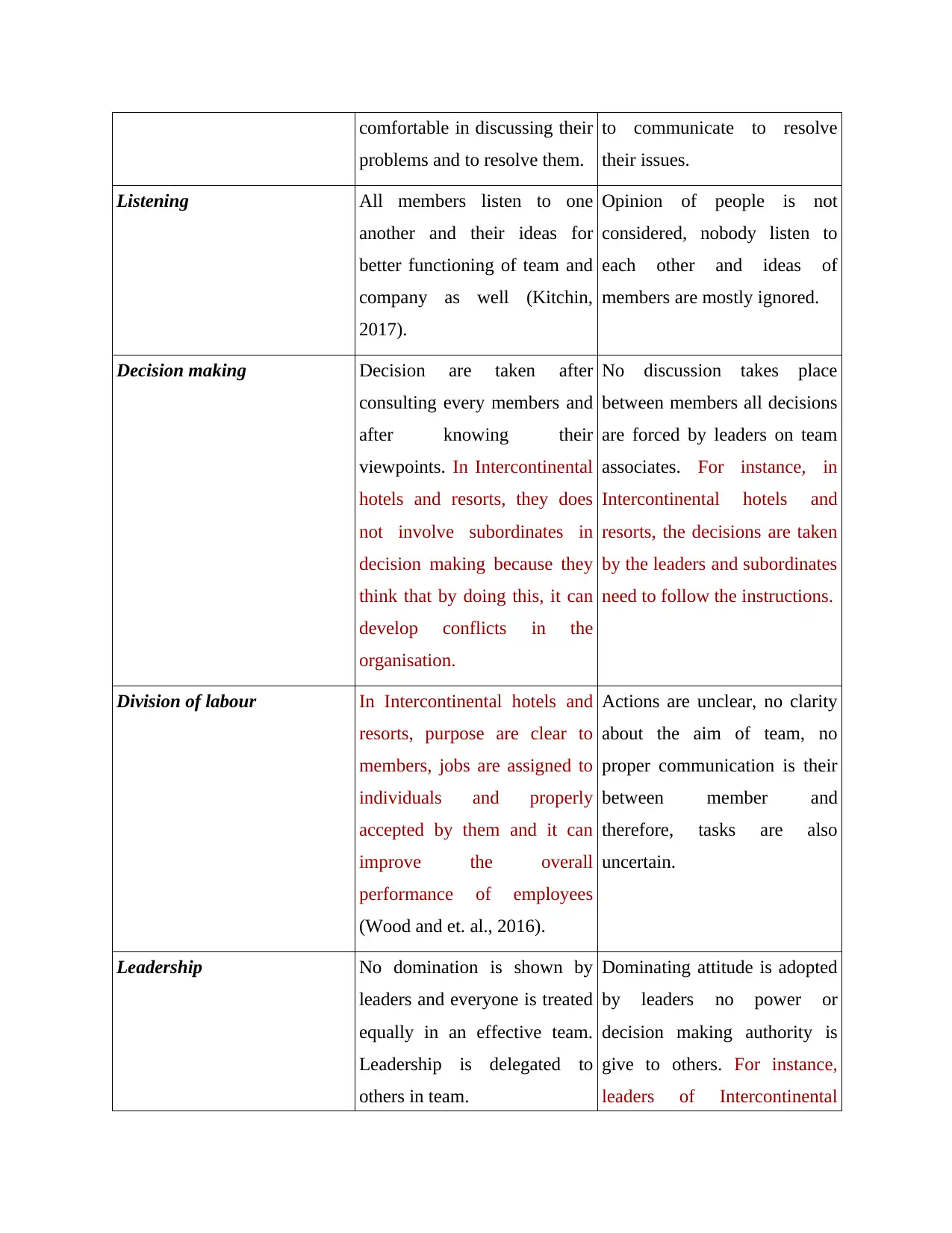
comfortable in discussing their
problems and to resolve them.
to communicate to resolve
their issues.
Listening All members listen to one
another and their ideas for
better functioning of team and
company as well (Kitchin,
2017).
Opinion of people is not
considered, nobody listen to
each other and ideas of
members are mostly ignored.
Decision making Decision are taken after
consulting every members and
after knowing their
viewpoints. In Intercontinental
hotels and resorts, they does
not involve subordinates in
decision making because they
think that by doing this, it can
develop conflicts in the
organisation.
No discussion takes place
between members all decisions
are forced by leaders on team
associates. For instance, in
Intercontinental hotels and
resorts, the decisions are taken
by the leaders and subordinates
need to follow the instructions.
Division of labour In Intercontinental hotels and
resorts, purpose are clear to
members, jobs are assigned to
individuals and properly
accepted by them and it can
improve the overall
performance of employees
(Wood and et. al., 2016).
Actions are unclear, no clarity
about the aim of team, no
proper communication is their
between member and
therefore, tasks are also
uncertain.
Leadership No domination is shown by
leaders and everyone is treated
equally in an effective team.
Leadership is delegated to
others in team.
Dominating attitude is adopted
by leaders no power or
decision making authority is
give to others. For instance,
leaders of Intercontinental
problems and to resolve them.
to communicate to resolve
their issues.
Listening All members listen to one
another and their ideas for
better functioning of team and
company as well (Kitchin,
2017).
Opinion of people is not
considered, nobody listen to
each other and ideas of
members are mostly ignored.
Decision making Decision are taken after
consulting every members and
after knowing their
viewpoints. In Intercontinental
hotels and resorts, they does
not involve subordinates in
decision making because they
think that by doing this, it can
develop conflicts in the
organisation.
No discussion takes place
between members all decisions
are forced by leaders on team
associates. For instance, in
Intercontinental hotels and
resorts, the decisions are taken
by the leaders and subordinates
need to follow the instructions.
Division of labour In Intercontinental hotels and
resorts, purpose are clear to
members, jobs are assigned to
individuals and properly
accepted by them and it can
improve the overall
performance of employees
(Wood and et. al., 2016).
Actions are unclear, no clarity
about the aim of team, no
proper communication is their
between member and
therefore, tasks are also
uncertain.
Leadership No domination is shown by
leaders and everyone is treated
equally in an effective team.
Leadership is delegated to
others in team.
Dominating attitude is adopted
by leaders no power or
decision making authority is
give to others. For instance,
leaders of Intercontinental
⊘ This is a preview!⊘
Do you want full access?
Subscribe today to unlock all pages.

Trusted by 1+ million students worldwide
1 out of 19
Related Documents
Your All-in-One AI-Powered Toolkit for Academic Success.
+13062052269
info@desklib.com
Available 24*7 on WhatsApp / Email
![[object Object]](/_next/static/media/star-bottom.7253800d.svg)
Unlock your academic potential
Copyright © 2020–2025 A2Z Services. All Rights Reserved. Developed and managed by ZUCOL.




